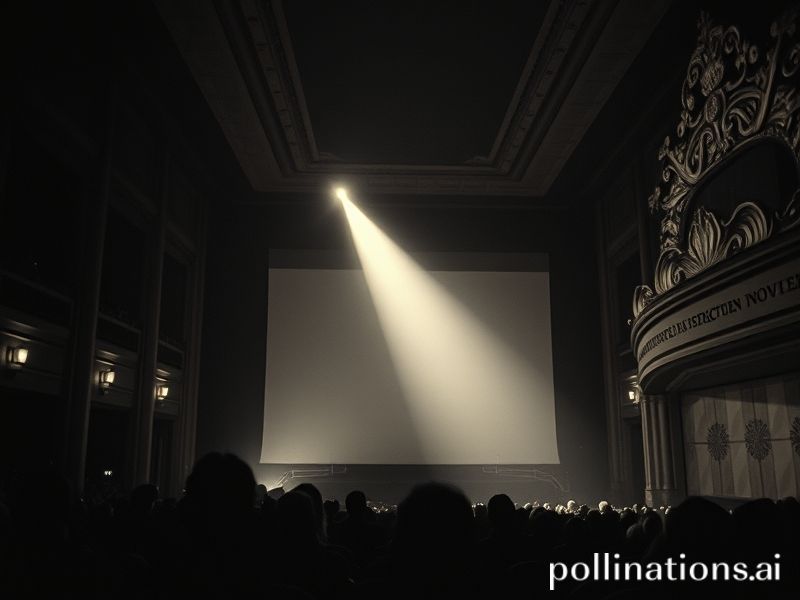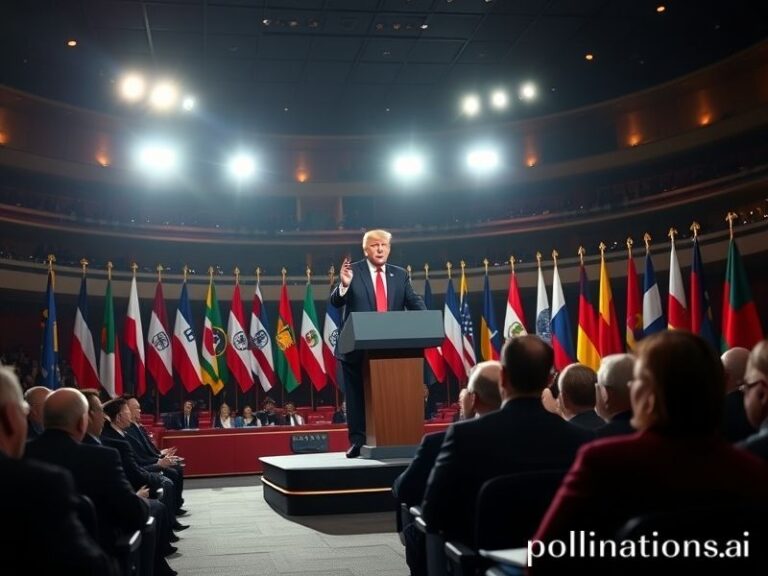Worldwide Box Office of Delusion: How Cinema Became the Planet’s Preferred Escape Hatch
Cinema, the art form that once asked us to sit in the dark and pretend the world made sense, is now the planet’s most reliable export of delusion. From Lagos to Lapland, humans still queue—online or in the rain—to watch other humans pretend the rent is paid and the planet isn’t on fire. Call it escapism, call it culture, call it whatever helps you sleep after the credits roll. The show, like the climate crisis, must go on.
Start in Hollywood, that gated suburb of collective fantasy. Having successfully monetised the apocalypse (zombies, asteroids, multiverses), the studios have pivoted to the only thing left: the end of Hollywood itself. Writers and actors recently discovered that their likenesses can be stored on a server, union dues optional. After a brief tantrum on picket lines conveniently located near smoothie bars, they returned to work under a compromise that guarantees residuals in exposure bucks. Meanwhile, Netflix green-lights “Content Farm: The Series,” filmed entirely by algorithm, starring your dead grandmother’s deepfake. International audiences applaud. The subtitles are perfect; the soul, optional.
Cross the Pacific and you’ll find China’s film industry, where every blockbuster doubles as a civics lesson. Ticket sales are measured in billions of yuan and in correct political alignment. If a film flops, it’s re-edited until it succeeds ideologically; if it succeeds, it’s re-edited anyway, just in case. The government’s latest five-year plan promises “Socialist Cinema with Reel Characteristics.” Viewers respond by flocking to Korean dramas on VPNs, proving that no firewall is taller than teenage thirst.
Slide down to India, where Bollywood still produces more movies per year than the rest of humanity produces rational decisions. Each three-hour epic contains six musical numbers, two car chases, and one moral so unambiguous it could be used as a cudgel. The industry’s secret is volume: if you shoot enough dance sequences on Swiss glaciers, eventually the glacier writes you into its will. Climate change is merely product placement for the next water crisis musical.
Hop over to Nollywood, Nigeria’s scrappy miracle. Shot in a week on budgets smaller than a Cannes afterparty bar tab, these films stream directly to diaspora phones from Lagos to London laundromats. The plots are bonkers—village witches using Venmo, pastors negotiating with UFOs—but the message is universal: family is sacred, corruption is lucrative, and the dead never stay dead if there’s a sequel cheque. UNESCO now lists Nollywood as intangible cultural heritage, right next to “bureaucratic optimism.”
Europe, meanwhile, clings to the illusion of art. French cinephiles still debate whether subtitles constitute cultural imperialism while munching organic popcorn flown in from Peru. The Cannes red carpet has become a catwalk for sustainable fashion—this year’s must-have accessory was a reusable tear-gas canister. Streaming giants court the continent with “local-language originals,” which means hiring Danish actors to speak English with a Danish accent so Americans can pretend they’re cosmopolitan.
And then there’s the global south’s newest disruptor: Saudi Arabia, where cinemas reopened in 2018 after a 35-year hiatus. The first multiplex featured reclining seats, Dolby Atmos, and an imam-approved edit of Black Panther where romance scenes were replaced by additional car chases. Vision 2030 promises a film industry “rooted in authentic Saudi narratives.” Rumour has it the first authentic narrative involves a heroic prince nationalising Netflix; development meetings are catered by Aramco.
What does it all mean? Simply that cinema has become the world’s lingua franca of denial. We pay to sit in the dark and watch better-looking people survive worse odds. The popcorn is overpriced, the ice caps are melting, but the projector keeps whirring because the alternative—turning the lights on—is unbearable. In every country, the plot is the same: pretend the ending is happy until the house lights force us back into daylight, blinking and vaguely ashamed, already queuing for the next matinee of mass distraction.
Fade to black. Roll credits. Please dispose of your 3-D glasses in the designated existential receptacle.







